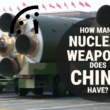Technological progress, not political control
By P. R. Kumaraswamy, May 10, 2012
Does any intrinsic link connect nuclear energy and weaponization programs? This has developed as the central issue of this Roundtable — and the evidence presented here does not substantiate the idea that such a link exists. Both Gilberto Jannuzzi and I have argued extensively that the global nonproliferation regime tends to exaggerate proliferation risks, potentially impeding developing countries' legitimate ambitions to develop nuclear power sectors; and Shahriman Lockman, though he regards proliferation as a greater risk than do the other Roundtable participants, does not argue that the spread of nuclear power will likely lead to the spread of nuclear weapons. To be sure, some countries have embarked on nuclear energy programs and then undertaken weaponization processes as well. But even in India, a conspicuous case, the desire for nuclear energy was not merely an excuse for weaponization.
Given the consensus that has developed regarding this Roundtable's central theme, it seems worthwhile now to focus additional attention on one region where nuclear issues are particularly fraught. That region is the Middle East — where the Arab Spring has underscored the need in many countries for new energy options, including nuclear energy. The weakening of central authority in Egypt, for example, has led to several acts of sabotage against the Egypt-Jordan gas pipeline, intensifying an existing energy shortage in Jordan. That shortage, along with the meagerness of the state's economic resources, undermines the stability of the government — and the strains remain even though the reform measures that Jordan has initiated amid the Arab Spring are more significant than those instituted by many other Middle Eastern countries. In Jordan, nuclear energy may be the only realistic option for meeting national energy needs — and may also be necessary if the country is to implement further, long-awaited political reforms.
Still, nuclear energy's importance as an electricity source does not eliminate proliferation concerns. Israel's long-standing nuclear capability has not spurred a nuclear arms race, but this does not mean that Arab countries have reconciled themselves to nuclear asymmetry in their region. Instead, a US carrot-and-stick policy has dissuaded Arab nations from pursuing the nuclear option. Israel, meanwhile, despite occasional lapses, has maintained an opaque nuclear posture since the late 1960s, thereby avoiding international sanctions.
In the Middle Eastern context, a nuclear-weapon-free zone continues to be a utopian idea, as no meaningful progress toward this goal can occur without a comprehensive settlement of the Arab-Israeli conflict. The only realistic solution to that conflict — a two-state option, with Israel and Palestine existing side by side — continues to be elusive. But in any case, the heart of the problem is not borders or settlements or other such issues, but rather acceptance of Israel as a political entity, with everything implied by that.
Meanwhile, the ongoing controversy surrounding Iran's presumed nuclear ambitions exposes the limits of the Nuclear Non-Proliferation Treaty's (NPT) ability to discourage proliferation while also guaranteeing signatories' legitimate right to develop nuclear power. If Iran becomes a de facto nuclear weapon state, countries like Saudi Arabia, Turkey, and Egypt might seek such weapons too, or at least a nuclear umbrella. Israel might be tempted to brandish its nuclear capability openly. Hence, it is not an exaggeration to say that the survival of the NPT regime hinges on the regime's ability to ensure that Iran remains a non-nuclear weapon state.
But again, regarding the central issue of a link between nuclear energy and weaponization, risks are inherent in any technology and nuclear energy is a more dangerous technology than most. Still, to a significant extent, human progress depends on utilizing nuclear energy while minimizing its dangers. Progress is not advanced by denying technology to certain nations or exerting political control over them.
Topics: Nuclear Energy, Nuclear Weapons
Share: [addthis tool="addthis_inline_share_toolbox"]














